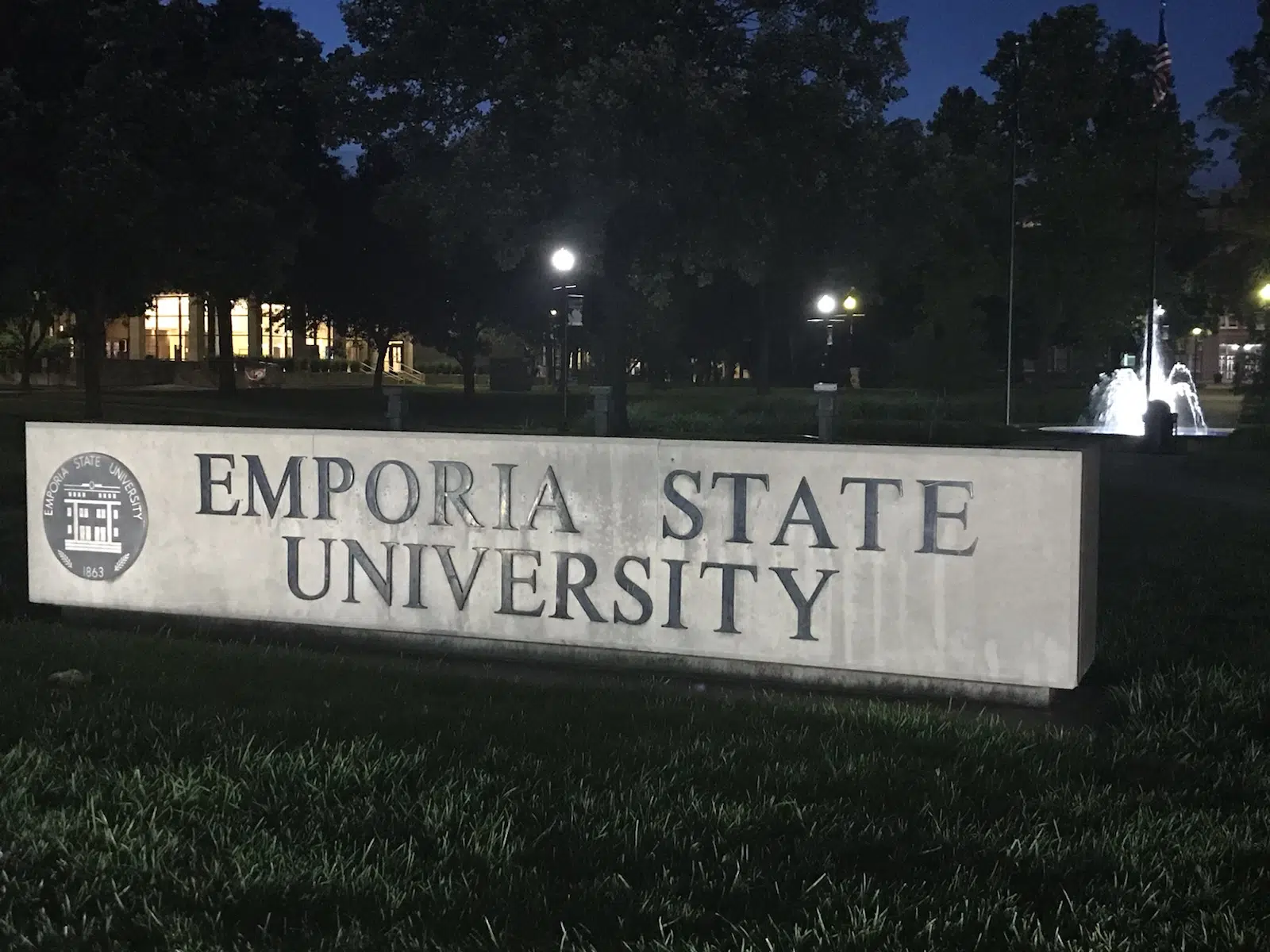Terminations started at Emporia State on Thursday after university administrators got approval from the Kansas Board of Regents to reshape its programs — and, as a result, its employee base.
Affected staffers — those to be “suspended, dismissed or terminated” — were called in for face-to-face meetings through Thursday. ESU has not said whether the process is completed or more such meetings are planned Friday, but the recently-approved Framework for Workforce Management said the notices will be delivered by Friday.
At Wednesday’s Kansas Board of Regents meeting, ESU President Ken Hush said seven percent of Emporia State’s workforce will be impacted, although he did not specify where the cuts would come, either when it comes to faculty versus other staff or by department. ESU has not confirmed the total employee number or the number of personnel cuts, but the Regional Development Association of East Central Kansas says the university listed 745 workers in its most recent survey. Given that number, a seven-percent cut means over 50 employees are affected.
The Regents concluded their meeting Thursday. Part of their business was to approve Emporia State’s plan to demolish Butcher Education Center next year as part of the university’s 2014 Campus Master Plan. The area around Butcher will become a reconfigured entrance for the west side of the campus. The Center for Early Childhood Education is closing by August 2023 as a corresponding move.
11:45 am Thursday: Termination notices being delivered; official word on program cuts pending
Terminations have started at Emporia State University.
Director of Media Relations Gwen Larson confirmed the notices to KVOE News on Thursday. She says the university can’t comment on the number of employees or their affected departments, and ESU won’t have any more information to release until this process is finished and the campus community is updated — including the programs themselves to be cut back or eliminated.
ESU wasted no time in beginning the termination process after gaining unanimous approval Wednesday from the Kansas Board of Regents on its Framework for Workforce Management. The plan has two basic components: a renewed focus on certain programs in a so-called “strike zone” while ending others and having the “latitude and expediency” on staffing decisions, including suspending, dismissing or terminating any university employee for a variety of reasons. Seven percent of Emporia State’s total staff is likely to be impacted.
ESU’s request to the Board of Regents after a better than 20 percent drop in on-campus enrollment and a smaller drop in total enrollment since 2017, as well as ongoing financial difficulties directly connected to COVID-19. Several faculty members and students have challenged the stated student-driven approach, saying this is designed to end tenure and could lead to increased troubles with recruitment and retention, along with diminished education quality and the eventual reduction of enrollment.
3 am Thursday: Seven percent of staff to receive suspension, dismissal or termination notices by Friday
Emporia State University’s Workforce Management Framework Policy has been given the blessing of the Kansas Board of Regents. And with that, seven percent of Emporia State’s total workforce will receive notices of their suspension, dismissal or termination no later than Friday.
Regents members voted unanimously to approve the framework as part of their regular meeting Wednesday afternoon. The decision came following comments from ESU President Ken Hush and Interim Provost Brent Thomas.
Thomas says the framework will grant the university the “latitude and expediency” needed to set the university up for long-term success.
The policy gives the administration the leeway to “suspend, dismiss or terminate any university employee” for several stated factors, including low enrollment, operations costs, revenue reductions, resource realignment, performance evaluations, teaching and research productivity and low service productivity, but it also indicates this is not the complete list and the full list of termination reasons is not stated.
Neither Thomas nor Hush have detailed any programs that may be up for consideration, however, Hush stated any decisions are the result of an extensive “academic review process.”
Furthermore, Thomas stated the leadership team tasked with overseeing the review had input from individuals representing all areas of the ESU campus.
In cases of suspension, dismissal or termination, President Ken Hush shall provide at least 30 days written notice, including reasons for the action being taken. Affected employees can then appeal through the Board of Regents office within 30 days, followed by another 30-day window for Hush to respond and a 10-day window for the matter to be referred to the KBOR Office of Administrative Hearings.
Employees have the burden of proof, according to the policy. Those who win their appeals will be entitled to reinstatement, back pay and restoration of other lost benefits.
President Hush has said the ESU framework is needed to because of a notable decline in on-campus enrollment and a lower-level decline in overall enrollment the past five years, as well as ongoing negative financial effects of COVID-19 and a need to update class offerings that reflect the university’s “strike zone.” The Faculty Senate strongly disagrees, saying the framework is nothing more than a way to end tenure, either on a temporary or permanent basis.
English, Modern Languages and Journalism Professor Dan Colson called the move politically motivated, given the Republican supermajority in the Kansas Legislature and Hush’s tenure as an executive in Koch Carbon. Colson says members of faculty leadership were not included in the policy’s development process until late, and student government leaders have said the same thing. He also sees the rift between administration and faculty, mentioned on several occasions last week, will serve to hinder recruiting and retention of faculty, which will diminish education quality and will eventually reduce enrollment.
Lost in the concerns about tenure is one of the policy’s other stated goals, which is focusing university attention on certain programs while ending others outside the so-called “strike zone.” Colson believes cuts will be targeted at the arts and humanities. Hush anticipates two percent of the current student body will be affected and those students will have opportunities to finish their programs as ESU students. Social Sciences, Sociology and Criminology Professor Michael Smith is a department chair, so he spoke to KVOE News “as a member of the ESU community.”
Smith declined comment about tenure concerns, but he says he would have rather seen the university halt its current review process without changes, use federal CARES Act funds and other money to stabilize the ESU budget for the next year and work with the Kansas Leadership Center on re-envisioning campus operations — as outlined in in online petition that has gained 800 signatures this week.
Statement from President Ken Hush to Emporia State faculty, staff and students
Dear Students, Faculty + Staff,
As many of you now know, today the Kansas Board of Regents approved the use of the ESU Workforce Management Framework from now through its expiration on December 31, 2022. This policy enables ESU to make program and workforce adjustments that best position ESU for the future.
This is one of many steps we are taking to further elevate our academic programs and enrich the student experience at ESU. To that end, I want to be clear that our focus is, and will remain, the students.
The next step after today’s Board approval is to communicate by the end of this week with those who are directly impacted. Once we have spoken with affected employees, we will begin sharing additional information with you.
STUDENTS
Because our responsibility is to you and to future students, we will continue to provide top quality, relevant programs that will prepare you for today’s workforce upon graduation. The Workforce Management Policy will affect a limited number of students (less than 2%) in specific programs. Students affected by the policy will be communicated with and given a generous amount of time to complete their program without the need to transfer.
What do these changes mean to affected students?
*You will be able to complete your current program at the same quality and standard at Emporia State University. You do not need to transfer schools.
*The quality of programming will continue through completion.
*You will continue to receive current scholarships and financial aid.
*Professional advisors will be there to help you as you complete your degree program as planned.
*You will have access to mental health services should you need them.
UNIVERSITY EMPLOYEES
To provide the most advance notice possible, university employees (faculty + staff) directly impacted will be notified by Friday, September 16.
Impacted Faculty + Staff
*The vast majority of impacted employees will have the opportunity to remain at ESU through May 2023, which is the end of this academic year, and will have the opportunity to receive three months’ severance pay at that time.
*Impacted employees will have access to outplacement services to help you find your next opportunity.
*ESU human resources will be available to answer questions and provide resources to support you through the transition.
*You will have access to mental health counseling options.
I am deeply aware of how difficult and distressing the initial effects of this organizational restructuring may be for those who are directly impacted and for our campus community as a whole. We have been limited in how much information we can offer because of the sensitive and confidential nature of matters that involve personnel and programs. I realize this can be both unsatisfying and frustrating. These steps are necessary, however, to move us toward an exciting, successful future. I will keep you updated as information becomes available and is made public.
Statement from President Ken Hush after Kansas Board of Regents vote
“We appreciate the Kansas Board of Regents’ approval of the Emporia State University Framework for Workforce Management. This framework will give ESU the flexibility to transform ESU in the best interest of our students and will allow ESU to be here to serve students for the next 159 years.
“Our next step is to share the details about this transformation to those individuals directly affected and our campus community. We anticipate our colleagues and students will receive details by the end of this week, although that could be subject to change if necessary.”





















